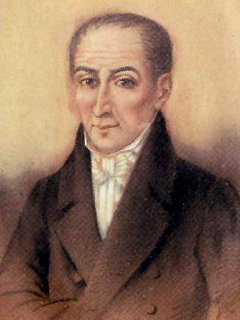Juan José Paso facts for kids
Quick facts for kids
Juan José Paso
|
|
|---|---|
 |
|
| Member of the Primera Junta and the Junta Grande | |
| In office 25 May 1810 – December 1811 |
|
| President | Cornelio Saavedra |
| Member of the First Triumvirate | |
| In office 23 September 1811 – 23 March 1812 Serving with Feliciano Chiclana, Manuel de Sarratea
|
|
| Succeeded by | Juan Martín de Pueyrredón |
| Member of the Second Triumvirate | |
| In office 8 October 1812 – 20 February 1813 Serving with Antonio Álvarez Jonte, Nicolás Rodríguez Peña
|
|
| Succeeded by | José Julián Pérez |
| Representative to the Congress of Tucumán | |
| In office 24 March 1816 – 11 February 1820 |
|
| Personal details | |
| Born | 2 January 1758 Buenos Aires |
| Died | 10 September 1833 (aged 75) Buenos Aires |
| Nationality | Argentine |
Juan José Esteban Paso (born January 2, 1758, in Buenos Aires; died September 10, 1833) was an important Argentine politician. He played a key role in the events that led to Argentina's independence. These events began with the May Revolution in 1810.
Contents
Juan José Paso: A Life of Service
Early Life and Education
Juan José Paso was the son of Domingo de Passo. His father moved to Buenos Aires from Spain in 1750. Domingo worked as a baker, which was important because bread was hard to find then. Domingo married María Manuela Fernández Escandón in 1755. After his marriage, Domingo became a vecino, which meant he was a recognized citizen of the city.
Juan José Esteban Paso was born on January 2, 1758. He was baptized just five days later. We don't know where he went to school first. However, it was not the famous Real Colegio San Carlos.
Paso later studied at the University of Córdoba. He earned a degree in Theology in 1779. After that, he returned to Buenos Aires. He became a philosophy professor at the Colegio Real de San Carlos. In 1783, he moved to Upper Peru (now Bolivia). There, he studied law at the University of Chuquisaca. He came back to Buenos Aires as a lawyer in 1803.
After the British invasions of the Río de la Plata, Paso became interested in politics. He joined the revolutionary leaders. This was because a new sense of national identity was growing among the criollos (people of Spanish descent born in the Americas). Like many important Argentines of his time, he was also a freemason.
Joining the Juntas
Paso took part in the Cabildo Abierto (an open town council meeting) on May 22, 1810. He strongly supported removing the viceroy Baltasar Hidalgo de Cisneros. His powerful speech convinced many people.
On May 25, he helped create the First Junta (Primera Junta) government. He was named Secretary of the Junta, along with Mariano Moreno. They both shared similar political ideas. The Junta sent him to Montevideo (now the capital of Uruguay). His job was to share the ideas of the revolution there.
Paso was also a member of the First Triumvirate and the Second Triumvirate. These groups governed the United Provinces of the Río de la Plata (which became Argentina) from 1811 to 1814. During this time, he participated in the Asamblea del año XIII (Assembly of the Year XIII). He was also sent to Chile as a representative. However, his talks with Chilean patriots did not succeed. Chile decided not to join the Union at that time.
The Congress of Tucumán
In 1815, Paso was appointed as an assistant to the Supreme Director. He also worked as a war consultant. Later, he was chosen to represent Buenos Aires at the Congress of Tucumán. This Congress declared Argentina's Independence on July 9, 1816.
As Secretary to the Congress, Paso had the important job of reading the Declaration of Independence. After this, he was briefly held and accused of supporting a monarchy for the new nation. However, he was quickly released, along with other representatives who had similar ideas.
Later Political Career
In 1822, Paso was elected to the Buenos Aires Province Legislature. He later became the president of this group. In 1824, he was again chosen as a representative for the National Congress. He supported Bernardino Rivadavia to become the first President of Argentina.
Paso decided to retire from politics in 1826. He was disappointed by the strong disagreements among the provinces. These provinces were divided into two main groups: the Unitarians and the Federalists.
See also
 In Spanish: Juan José Paso para niños
In Spanish: Juan José Paso para niños
 | Aaron Henry |
 | T. R. M. Howard |
 | Jesse Jackson |

